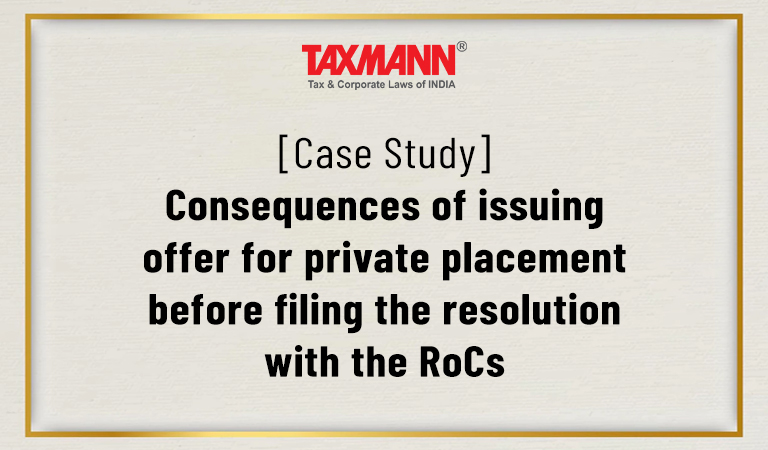[Case Study] Consequences of issuing offer for private placement before filing the resolution with the RoCs
- Blog|News|Company Law|
- 3 Min Read
- By Taxmann
- |
- Last Updated on 29 October, 2022

[2022] 143 taxmann.com 350 (Article)
1. Private Placement
Private placement by companies means offering its securities or inviting to subscribe its securities for a select group of persons other than by way of a public issue through a private placement offer letter. Private placement of securities can be made only to select persons or identified persons, as identified by the board of the company. A company making a private placement cannot offer its securities through any public advertisements or utilise any marketing, media, or distribution agents or channels to inform the public about such an offer. If the offer is advertised or marketed, it will be considered a public offer and not a private placement by the company.
Section 42 of the Companies Act, 2013 provides that a company can make a private placement to a select group of persons. The company can make a private placement of its securities after the approval of shareholders of the company for the proposed offer or invitation to subscribe to securities by passing a special resolution for every offer or invitation. It is important to note that the relevant special resolution is required to be filed with the Registrar of companies and only thereafter the offer cum application letter could be issued by the company pursuant to Rule 14 (8) of the Companies (Prospectus and Allotment of Securities) Rules 2014. Therefore, the company not only needs to pass the special resolution, but the same is also required to be filed with the Registrar of Companies before the company proceeds to issue the offer cum application letter to the proposed allottees.
2. Relevant provisions of the Companies Act
The following are the relevant provisions under the Companies Act 2013 on this matter.
Companies Prospectus and allotment of securities Rules
Rule 14 (8) of theCompanies (Prospectus and Allotment of Securities) Rules 2014 spells out that a company shall issue a private placement offer cum application letter only after the relevant special resolution or the board resolution has been filed with the Registrar of Companies.
3. Penal provisions for default/non-compliance
As per section 450 of the Companies Act 2013 (punishment where no specific penalty or punishment is provided) it says that if a company or any officer of a company or any other person contravenes any of the provisions of this Act and the rules made there under or any condition, limitation or restriction subject to which any approval, sanction, consent, confirmation, recognition, director or exemption in relation to any matter has been accorded, given or granted and for which no penalty or punishment is provided elsewhere in this Act, the company and every officer of the company who is in default or such other person shall be liable to a penalty of ten thousand rupees, and in case of continuing contravention, with a further penalty of one thousand rupees for each day after the first during which the contravention continues, subject to a maximum of two lakh rupees in case of a company and fifty thousand rupees in case of an officer who is in default or any other person
4. Consequences of default/violation – action from the Regulator
To understand the consequences of any default in complying with the Rule 14 (8) of theCompanies (Prospectus and Allotment of Securities) Rules 2014 relating to the issue of an offer cum application letter for private placement, let us go through one of the decided case law on this matter very recently – during the month of September 2022 – by the Registrar of Companies of Mumbai.
5. The relevant case law on this matter
We shall go through a case law relating to an adjudication order passed by the Registrar of Companies, NCT Delhi & Haryana who was the Adjudicating officer in this case, bearing order No.ROC-D/ADJ/order R 14(8)/6269-6272 dated 21st October 2022 in the matter of Adjudication for Penalty under section 454 of the Companies Act 2013, 2014 for violation of Rules 14(8) of the Companies (Prospectus and Allotment of Securities) Rules 2014 read with section 450 of the Companies Act 2013 in the matter of M/s Gozing Technology Private Limited.
Click Here To Read The Full Article
Disclaimer: The content/information published on the website is only for general information of the user and shall not be construed as legal advice. While the Taxmann has exercised reasonable efforts to ensure the veracity of information/content published, Taxmann shall be under no liability in any manner whatsoever for incorrect information, if any.

Taxmann Publications has a dedicated in-house Research & Editorial Team. This team consists of a team of Chartered Accountants, Company Secretaries, and Lawyers. This team works under the guidance and supervision of editor-in-chief Mr Rakesh Bhargava.
The Research and Editorial Team is responsible for developing reliable and accurate content for the readers. The team follows the six-sigma approach to achieve the benchmark of zero error in its publications and research platforms. The team ensures that the following publication guidelines are thoroughly followed while developing the content:
- The statutory material is obtained only from the authorized and reliable sources
- All the latest developments in the judicial and legislative fields are covered
- Prepare the analytical write-ups on current, controversial, and important issues to help the readers to understand the concept and its implications
- Every content published by Taxmann is complete, accurate and lucid
- All evidence-based statements are supported with proper reference to Section, Circular No., Notification No. or citations
- The golden rules of grammar, style and consistency are thoroughly followed
- Font and size that’s easy to read and remain consistent across all imprint and digital publications are applied



 CA | CS | CMA
CA | CS | CMA
